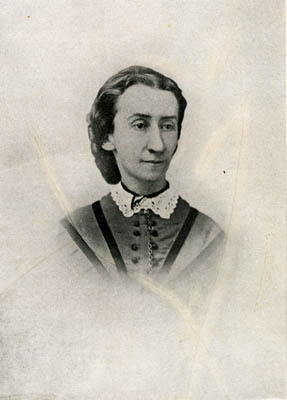|
In Memorium E.L.R. [Emma Lydia Rankin Memoirs] |
| |
| |
|
[Cover of booklet] In Memorium E.L.R. |
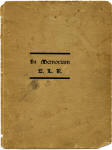 |
| |
|
[Photograph of Emma Lydia Rankin.] |
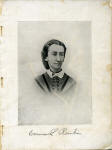 |
| page 3 |
|
Emma
Lydia
Rankin
Third daughter of Rev. Jesse and Ann Delight
Rankin.
July 29, 1838 — February 28, 1908.
This gifted woman
received from her parents, both of whom were teachers of wide reputation,
the benefit of a thorough classical
education, which would have qualified her for entrance to the higher
classes of any of our colleges. She assisted them in teaching for a number
of years, and when the infirmities of age came upon them, she, with her
older sister, Miss Sarah, continued the limited home school known as
"Kirkwood" Emma taking the active management of the school room, and her
sister the art department.
She was eminently
learned and accomplished, skilful in imparting
instruction to her pupils, and what is at least somewhat unusual with the
sex, an expert mathematician who seemed to take positive delight solving
difficult problems in the higher
mathematics.
Training the minds and hearts of young women was
her life work and she adorned the profession of her choice. Her
pupils — she always spoke of them as
"my girls" — came from excellent families in all sections of the
State. A large part of the patronage of the school being from religious
denominations other than that of the teacher. They reflected her faithful
training in their lives and in them was fulfilled the prayer of the
psalmist, "That our daughters become as corner stones polished after the
similitude of a palace."
She inherited from a pious ancestry a love for
the Presbyterian Church of which she was a devoted member for over three
score years. To her strenuous efforts and most liberal contri-
3 |
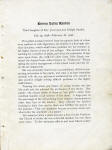 |
| page 4 |
|
butions, the church is
largely indebted for the fine brick Manse
in Lenoir, built in
1893, and in a good measure the same may be
said of the new
Presbyterian Church built a decade later. Her
aid to this church did not end with the
completion of the elegant building. It
was followed by a gift of the large and valuable lot in front of the
church, which adds greatly to the convenience of the congregation and to
the beauty of the grounds.
After the completion of the Manse, selling her
old home she secured a lot near the homes of her two married sisters, and
on it erected a large and convenient brick dwelling, almost a duplicate
of the Manse building.
In this she and her sister Sarah resided during
the remainder of their lives.
Her final active
benevolent work and one which enlisted her
warmest sympathy during
the closing years of her
life,
was in aid of that noble charity, the
Barium Springs Orphanage.
In the year 1875, "The Vesper Reading Club of
Lenoir," which, as its records show, maintained its organization with
regular weekly or bi-weekly meetings for over twenty years,
appointed a committee of three of its
members to report, if the way be clear, a plan for establishing a
circulating library for the town. This
committee, of which Miss Rankin was a member, reported favorably
and resulted in opening the Pioneer Library, which, from a small
beginning, grew with the years and, up to the era of the Carnegie
Libraries, was perhaps the largest
town library in the State. She was a moving spirit in it
for many years, and during the last
years of her life she served as purchasing agent and librarian, a
work for which, so long as her strength remained, she was particularly
fitted.
In her home, April 8th,
1907, she received a fall which fractured
or otherwise injured the bones of the right hip joint.
4 |
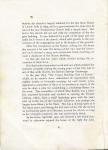 |
| page 5 |
|
[Photograph] Kirkwood [Home School for Girls], 1896.] |
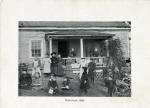 |
| page 6 |
|
From the effects of
this accident she recovered so far that she could, with the aid of a
staff, walk for short distances, though
not without discomfort,
when on November 6th, following, she
met with a similar fall
in her home, which broke the bones at
the same joint on the
left side. From the effects of this misfortune
she never recovered. Her strength gradually gave
way, and for months enduring great
bodily suffering, which the surgeon's skill, loving hearts, and
tender hands always at her bedside, were powerless to control, her pure
spirit
took its flight to
join
her loved ones who had preceded her to
that better land.
The accident which
shortened this useful
life,
doubtless, resulted
directly from weakness incurred by the constant loving care in nursing her
maiden sister who was a confirmed invalid
for over three years before her death.
With her death, following that
of her sister, the light literally went out of the house
which had been kept bright and
pleasant, abounding in hospitality
for so many years, and a refined home as it had existed,
was closed forever.
The writer feels assured
that the spontaneous heart-felt
tributes, which he is
permitted by the writers to copy elsewhere
in this booklet, to her
refined Christian character and its far-reaching
influence, will touch a responsive chord in the hearts
of "her girls" and of many other loving friends
into whose hands this memorial may come.
G. W. F.
harper.
Lenoir, N. C, July 10,
1908.
6 |
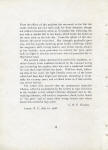 |
| page 7 |
|
(The News, Lenoir, N. C., March
27, 1908.)
IN MEMORY OF MISS E. L. RANKIN.
(By one of the many of "her girls" who rise up
to call her blessed.)
Methinks there falls on listening ears,
The strains of Heavenly song, As at the shining
gate there stands
A glad and happy throng Of those who press to
welcome one
The Lord has loved so long. 'Tis she, the
steadfast one,
Whose friendship made us feel
That life
with all its change and chance,
Still held things true and real. And as the
angels lead her on,
Up to the waiting King,
A shining peace is on her face
For joy that she may bring, Not empty hands to
meet His clasp,
But full and running o'er, Of ransomed souls
who watched for her
Upon the farther shore.
For 'twas her
life
of righteousness
That shone, a strong white light, To point
them, as the way grew broad,
To paths of truth and right. And hear ye not
the Master's voice,
Saying, "Come thou
faithful one, Thine is the crown, the
victory,
7 |
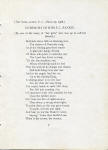 |
| page 8 |
|
For a noble
life
well done." The world seems
poorer now by far,
And the tears too
ready start, Since we lost her smile and helping hand,
And the sunshine
in her heart. Yet let there be no selfish grief
At close of
life
so true, In gentle strength and
wisdom rare,
She builded
better than she knew. And those of us who tarry yet,.
In precious
memory keep The lessons learned from her
life book
So full and sweet
and deep.
carrie stowe harrison.
MISS EMMA L.
RANKIN, OF LENOIR.
Lenoir, February
28.—Miss Emma L. Rankin, daughter of the late Rev. Jesse Rankin, the first
pastor of the Lenoir Presbyterian Church, died at her home here today in
her 70th year. She was widely known throughout the State as an
accomplished teacher, being for many years principal of the Kirkwood Home
School for Girls. Her father and mother were noted teachers and she
naturally inherited a love for her calling. She taught daughters and, in
some cases, granddaughters of her pupils, and enjoyed the respect and love
of her girls, who "rise up and call her blessed." Few women have exerted
an equal influence for good in any community. She was held in highest
esteem for her consistent Christian
life, her noble work and her wide influence.
The funeral
services will be held Saturday afternoon at the
8
|
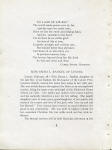 |
| page 9 |
|
Presbyterian Church, of which she was a devoted
member. The services will be conducted by Rev. C. A. Munroe, of Hickory,
in the absence of her pastor, Rev. D. P. McGeachy.—Charlotte Observer.
For the Presbyterian
Standard.
On February 28th, Miss Emma Rankin of Lenoir,
N. C., and daughter of the late Rev. Jesse and Ann D. Rankin, laid aside
the1 infirmities of the flesh, and entered into the perfect
life to be reunited with sainted
father, mother and sister. She was a woman of strong character and endowed
with a strong intellect which had been highly cultivated and used for the
highest good of others. Her life
was given to the work of teaching in which she was abundantly successful
in training both intellect and hearts.
Her influence had not been confined
to the home which was a small village
when she began her work there. Lenoir, which for years has been
noted for the intelligence and
high toned morality of its citizens, as the surrounding world well knows,
has been largely indebted for this high
standing among its sister villages and towns to the influence and
teachings of the family of which Miss Emma Rankin was a member. Though no
sons will perpetuate the memory of this godly household the influence of
its noble example and teachings will be felt for generations to come.
Miss Emma Rankin will have an enviable share in this influence through her
pupils widely scattered in various
localities. In such cases:
Why should we mourn departed friends,
Or start at death's alarms, 'Tis but the voice
that Jesus sends,
To call them to his arms.
Greensboro, N.
C.
J. C. wharton.
9 |
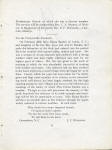 |
| page 10 |
|
[Photograph of "Rev. Jesse Rankin", Presbyterian minister
in Lenoir, NC and father of Emma Lydia Rankin.] |
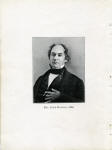 |
| page 11 |
|
For the Lenoir Topic.
MISS EMMA LYDIA RANKIN.
Born, lived, died, can be
written of every animate thing as marking three great events of earthly
existence. All men are born, all must die; but how few truly live. In
living there is example, instruction and inspiration. "So teach us to
number our days that we may apply our hearts unto wisdom," prays the
psalmist. What follows is seen only through the eye of faith. The subject
of this sketched lived.
Miss Emma Lydia Rankin was
born July 29th, 1838, and died at Lenoir, N. C, February 28th, 1908. Her
father, the late Reverend Jesse Rankin, was the first pastor of the
Presbyterian congregation of Lenoir, and planted the seed of what has
since grown into so stately a tree. Her mother, Ann Delight, nee
Salmon, was in every way fitted to be the helpmate of the strong man, to
whom religion and society owe so much in this community. Sprung from such
stock, it is not strange that the daughter should have inherited the fine,
firm characters of the parents, together with the mental vigor which was
common to both.
Father and mother were
both teachers of repute, and realizing, as Scotch Presbyterians and their
descendants alone seem to realize, the duty and importance of a solid
education, they took care that their gifted daughter had all the
advantages that the times afforded. So being fully equipped, Miss Emma
early took up her life work, and
taught in Salisbury, Shelby, Pleasant Gardens, also near Fayetteville and
finally together with her elder sister, the late Miss Sarah Rankin,
established "Kirkwood School" for girls, in Lenoir, over which for many
years, she
11 |
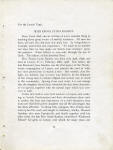 |
| page 12 |
|
continued to preside. Upon
the death of her sister, and finding her own strength failing, she decided
to close the school. A successor might have been found, but there was no
one that could give the school the individuality that has distinguished it
under her; and by reason of
which the beneficence of its mission had been so marked. So with a pang
that must have cut deep into her heart, she decided to discontinue
"Kirkwood." Henceforth, she taught only by the example of a nobly disciplined
life,
and a strong, gentle, loyal nature.
It is the well-founded
opinion of the writer, who has spent all his
life in and near Lenoir, and has
seen it grow from a disorderly and disreputable Court House village to its
present fair proportions, that
the town has never had any citizen,
man or woman, to whom it owes so much and who has left a deeper
impress upon its social and moral
life, than Miss Emma Rankin.
There be those among us
who never fell directly under her influence, who are better men and women because we have realized
to our sorrow that we have fallen far short of the correct ideals that she
taught and lived, and strayed widely from the straight path of
righteousness in which she moved.
She was a woman of
positive character. To her, right was right, and wrong was wrong. There
was no middle ground. No compromise.
I have heard her called
narrow in her views, but never incorrect. I have heard those who criticized her code as too rigid ;
but I have noticed that such criticism generally came at times when
the more liberal views of her critics had led them into excesses of which
they were heartily ashamed, or as a salve to a disturbe'd conscience. The
purity, the steadfastness, the correctness of her ideals were a constant
rebuke to us who fell so far short of her standard ; and even the worst
of us hastened to
12 |
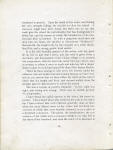 |
| page 13 |
|
place our daughters under her care that they
might learn her way, instead of our own.
She did not seek and did not have many
intimates, but she had a host of friends who were bound to her with hooks
of steel. Her girls, as she fondly called her pupils, loved and esteemed
her with a devotion that knew no change. During her last illness those
that were near were constant in their interest in her, and those at a
distance daily sent loving messages of cheer and hope. While on her sick
bed she often said that this interest and sympathy from those she had
taught gave her more real pleasure and gratification than anything else.
We may never know how far the circle set in motion by her hand may extend,
but we know "that her works do follow her." With all she was just and
kind, good and charitable. Many poor there are, who owe to her comfort,
help, and subsistance [sic] in time of sore need. These now that she is
gone, will miss her ministering hand and sincerely mourn her loss.
Taken all in all she was a remarkable woman and
we shall not soon again see her like.
edmund jones.
Lenoir, N. C, March 18, 1908.
(Presbyterian Orphans' Home, Barium Springs,
Ar. C., Rev.
John Wake field, Superintendent.')
TWO OF BLESSED MEMORY.
Two privileges enjoyed by the Superintendent of
the Orphans' Home compensate for the great responsibility he bears and
the anxiety he cannot escape. The first is the companionship of the
children, cheerful, hopeful, buoyant, expectant,
|
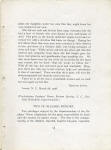 |
| page 14 |
|
courageous, impatient to meet the
responsibilities of life and
confident of success and also of the tender, loving, patient,
intelligent, consecrated persons who have the care and training of them.
The second is the sweet communion he holds, through correspondence, with
the choicest spirits of the land and the
cooperation he receives from them. Two
of these choice spirits have recently passed away from earth and
the Orphans' Home sustains an unspeakable loss. Both were pioneers in
certain lines of work and deserve
special mention.
One of them, Miss Emma L. Rankin of Lenoir,
long the Principal of the Kirkwood School, a woman of high
intellectuality and deep piety, appreciating the arduous labors of the
house-mothers and seeing the small pecuniary compensation they receive,
originated the "Mothers' Fund" for supplementing their salaries, showing
these consecrated women that their labors were appreciated by those best
prepared to put an estimate upon them. She rests from her labors but her
works do follow her, and the Orphans' Home will always have reason to
cherish and honor her memory. Her last days were days of great suffering,
but the Orphans' Home engaged her thoughts and prayers.
******
R. W.
boyd.
The Dispatch, Lexington, N.
C., March n, 1908.
Miss Emma L. Rankin, who died last week in
Lenoir, where she had lived for many years, teaching school, was the
daughter of the late Rev. Jesse Rankin, who once lived in Lexington. Miss
Rankin was in her 70th year. She was widely known as a
cultured, accomplished teacher. As principal of Kirkwood
|
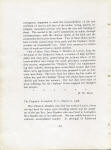 |
| page 15 |
|
School for girls in
Lenoir, she taught many a young lady who
was saddened to hear of her death. Her father
was a noted Presbyterian preacher and
educator.
RESOLUTIONS OF HONOR AND LOVE.
The session of Rankin
Presbyterian Church, Lenoir, N. C., mourns deeply the removal of our
esteemed, honored and beloved Emma
Rankin by the death angel. We pray that our
loss is Heaven's gain. We honored for her sympathy and
Christ-like feelings toward us. Her
donating to us a lot, upon which to erect a Presbyterian Church for the
colored people of Lenoir. We honored her for her philanthropic spirit. We
saw the trend of her soul; more
blessed to give than to receive. She has cast her bread upon the
water to gather after many days with
Saints in glory. She has sowed the seeds of love among
the poor, to reap a harvest of joy
among angels.
Whereas, It
has pleased God to call her from labor to reward
; be it Resolved: 1st.
That we tender the bereaved family, our
heartfelt sympathy. 2d. That we hold in
fond remembrance her kind
feeling toward us. 3d. That we appreciate what she
has done for us. 4th. That we revere
her lofty character. 5th. That a copy of these resolutions be sent
to the family and a copy to the Lenoir
News.
elder W. S.
craig,
elder turner norwood, mod.
Rev. M. E. powell,
Committee
|
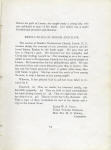 |
| page 16 |
|
STONEMAN'S RAID.
BY MISS E. L. RANKIN
The sketch of her thrilling
war experience was written in 1885 at
the request of "her girls," and was not intended at the time for
publication. It was published ten years later in the
Charlotte Observer and copied in the
Lenoir News.
It is given by request in
this memorial as an example of the faith, courage, and self-reliance of a
good woman under most trying
conditions.
The
"Pleasant Gardens," a section embracing a number of
fine plantations on the
Catawba River in McDowell County,
North Carolina, was so named and occupied and cultivated before
the American Revolution.
Major Ferguson, with his
little army, raided
this section in an attempt to
capture Col. McDowell only three weeks before the battle of King's
Mountain.
Lieut. Allaire of that
corps, in his diary says, as recorded in "Draper's King's Mountain and Its
Heroes:"
"Saturday, Sept. 16, 1780. Pleasant Garden is a very
handsome place. I was
surprised to see so beautiful a tract of land in the mountains. This
settlement is composed of the most violent Rebels I ever saw, particularly
the young ladies."
"Sunday, Sept. 17. Marched
two miles to Buck Creek, forded it and continued two miles further to a
Rebel, Major Davidson's plantation and
halted."
Here may be found the
ancestral homes of the Erwins, Carsons, Greenlees, Burgins, and other
prominent families. The cuts of the locality were made for this memorial
from recent photographs.
16 |
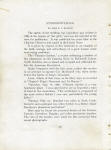 |
| page 17 |
|
[The Col. Logan
Carson mansion, Pleasant Gardens.] |
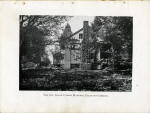 |
| page 18 |
|
STONEMAN'S RAID:
A North Carolina Woman's Experience in the Civil War.
The winter of 1863 found the writer employed as
a school ma'am in a family school, in an old-fashioned farm house at
Pleasant Gardens, in McDowell County, North Carolina. It was a huge old
house, with long, wide porches, the original building constructed of logs
12 inches square, sometime in the beginning of this century or the latter
part of the last. From time to time additions had been made to the main
building, numerous offices had been built, and it had been for years a
summer resort, well known to seekers of health and pleasure from eastern
Carolina. Pleasure seekers were few at this troublous time, but one or two
refugees, two or three school girls, the family, consisting of Col. Logan
Carson, his wife and two little girls
and myself occupied the wide old house. Besides it was, and has
been for many years, one of the stopping places on the old stage line
between Morganton and Asheville, and every morning the stage got in before
daylight, bringing a load of passengers, generally soldiers, who waited
for breakfast, and gave us the latest news. Our postoffice, Marion, being
four miles distant, mails were not received till 11 o'clock. In exciting
junctures, you could hear anything from the "reliable gentleman" who was
generally at this breakfast table, so that our hopes and fears were often
aroused, to be dashed or quieted when the mail arrived. Far removed from
the seat of war, our only contact with the outer world was at this
breakfast table.
Up to the winter of '64-'65 our
experience of the trials of the war, was confined to the anxiety about
friends in the army, and the privations which were lightly esteemed and
cheerfully borne, hoping always for a joyful end. True we were far
18 |
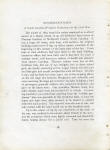 |
| page 19 |
|
from blockade goods, but what cared we. Factory
cloth, which our negroes used to wear, bought at a great price, and
warranted to last "until six months after a treaty of peace" made most
valuable underwear; and our homespun dresses, dyed in soft dark colors by
our native barks and roots, with a thread of real indigo or madder, and
made and fitted with as much care as would have been bestowed on handsome
material in former times, looked, as we imagined, very stylish. The
getting up of a bonnet was a difficult undertaking, as "sky-scrapers" were
i,u the fashion when the war commenced, and continued in vogue with us
till it closed, and it took no little to cover one of these aspiring
frames; but I had from various ancient receptacles, gathered together
silk, flowers, and above all, plumes, real ostrich plumes, all to match.
The plumes covered a deficiency in the silk, and underneath was a piece of
pasteboard, which supplied a deficiency in the frame, so the plumes were
absolutely essential to the recherche effect of the grand
combination. But one fatal Sunday, feeling unusually frisky when leaving
the church, I proposed to one of the children to take my place in the
carriage and let me ride the pony, accompanied by mine host, who always
went on horseback. I only added the long riding skirt to my church costume
and mounted for a four-mile ride. It was a clear, bright day in winter,
with a stiff breeze blowing, and I soon found that I carried too much
topsail, but managing, though with some difficulty, to keep my "sky-scraper"
on, I sailed in triumphantly, meeting the carriage, which had come by
another road, at the gate. The first remark of one of the children was:
"O, Miss R., what is the matter with your bonnet?" I put my hand up—the
plume was gone—and the pasteboard was bare. I walked on to my room, took
the bonnet off, looked at the sore place for the space of a minute calmly
19 |
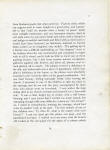 |
| page 20 |
|
took in the whole situation, and gave it up. I
had forded both the river and the creek, and the plume was probably
carried off by the fresh breeze in its clear sweep down the river. So
search was useless, and I laid the bonnet clown "slowly and tenderly,
fashioned so meagrely, so old, and so bare," and closely inspecting
my second best hat, resolved to promote it to a higher
position.
About a week afterwards, the children raised a
great outcry, "O, Miss R., your bonnet is found." I ran down to
meet the coming procession, and found them carrying the plume aloft,
looking like an old rooster on a rainy day. A cursory glance showed that
it was past recovery and "off duty forever."
However, more serious troubles were ahead of
us. The invading army in a constantly narrowing circle approached
u<.
We had thought it highly improbable
that a blue-coat would ever be seen in our secluded region, but rumors of
raids and marauders came thick and fast during the last winter of
the war. Kirk's men were plundering in the counties adjoining us, and had
come down within ten, and even five miles of us. We began to hide out our
clothes an to arrange our valuables when we retired as to best protect
them in case of a dash in the night. In the early spring of '65, it was
confidently reported that the Yankees were coming both from the east and
the west. One morning a gentleman well known to Col. C., came by from
Asheville and said we might certainly expect them that day or the next,
that he heard when only a few miles from Asheville that they had actually
reached that point, and we might look out.
The day was passed in anxious suspense, and we
looked up the road many times. It was Friday evening, and one of the
school girls who lived in Marion was going home. A saddled horse stood at
the gate, and a little negro boy, who had brought it for her, sat on a
mule close by. Just then a cry came that
20 |
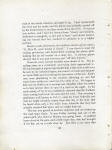 |
| page 21 |
|
[Photograph] "Pleasant Garden Ford, Catawba River." |
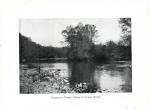 |
| page 22 |
|
the Yankees were coming. I
flew to the upper porch where I could best see the Asheville road, and
there sure enough was a column of mounted soldiers winding slowly round
the high hill that shut out the road from our view, at a distance
something less than a quarter of a mile. On reporting this a general
stampede commenced. The master of the house was rushed off through the
back door, his wife entreating him to leave her and fly. Every darkey on
the place, about fifty in number, placed their backs to the foe, and
pressed forward. A beautiful creek flowed through the yard, along the
banks of which was a road leading off at a right angle from the Asheville
road. Down this road ran men, women and children—helter-skelter,
pell-mell, some with a horse or a mule that they had been able to seize at
the moment, but more on foot. The little girl, anxious to reach home, had
mounted in hot haste and was clattering across the creek at 2 -.40
speed, followed by her muleterian escort. Before she had gone a hundred
yards, the girth broke, and down came "lady, saddle and all." A negro man
rushing ahead of her caught the horse and she, rising to her feet, nothing
hurt, screamed, "Put me on, Uncle Davis, please put me on." And this time,
either for greater security, the saddle being lost, or by accident, she
took a position in which she could have used both stirrups if there had
been any, and so, with bonnet off, hair flying, across the river, around
and over the hills, in less than half an hour she made the four miles, and
dashed into Marion and up to the male academy, where her brothers were,
screaming at the extent of her voice, "Four thousand Yankees at Uncle
Logan's ! Four thousand Yankees at Uncle Logan's !" a cry that she kept up
down the village street till she reached
her home.
In the meantime, Mrs. C.,
and I, with three children stood
22 |
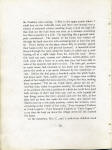 |
| page 23 |
|
on the porch with hearts in our throats,
awaiting the dreaded approach of the Yankees, who looked much less formidable near at
hand than far away. They made no stop, but went slowly
riding by, a company of some 50 or 60 men — some with Confederate
uniforms and some with no uniform at all. When they had nearly all passed
I turned and broke out into a laugh and cried out, "Are we going to let
these men pass without finding out who they are. Let us run and speak to
them." So the older girl and I ran to the gate, and found on halting the
troop, that it was a company of
Vaughn's men — some of our own precious cavalry, who for some
months had been roaming round in our mountain fastness, seeking what they
might devour, and now had unwittingly caused this panic. When the
situation was explained they were much amused, and rode on with the
inclination, it seems, to humor the joke. The first person they met
happened to be the very man who had come from Asheville in the morning and
brought the first report. On his return from Marion he had met the little
girl, and though hearing her screaming report, had determined to go a
little nearer and see for himself ; but meeting this cavalcade he wheeled
his horse, and as he did so, some of the boys for fun, fired their
pistols, which he, of course, thought aimed at him. He galloped back,
arriving in Marion shortly after the school girl, confirming her report,
and adding that the Yankees were just behind and had fired on him. The
result was that by the time these men rode quietly into the village, the
whole male population had gone, without "standing on the order of their
going." A recruiting officer who had been there for some months never
stopped till he reached Rutherfordton, 28 miles distant, where of course,
he told the tale as "twas told to him."
But there came a day when "wolf" was cried in
earnest.
23 |
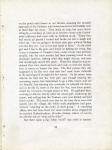 |
| page 24 |
|
About the middle of April, I went on Friday
evening to spend Saturday with a
friend, two miles off, across the river. Sunday morning before daylight I
awoke to find one of the ladies of the family standing by my bed
with a candle in one hand, and an open
letter in the other. I shall never forget the ghostly picture. The
tall figure with face as pallid as the night dress she wore, the dim blue
light, and the whole foreshadowing of evil. The letter was sent by special
messenger from Statesville, and informed us that Stoneman's raiders,
which had dashed in out of the State some weeks before, had appeared at
Salisbury, released their prisoners, captured our forces there, and were
en route for Tennessee, probably via Asheville. It is impossible to
realize now the dread terror with which we received these tidings. All the
horrors, of which we had heard from others, were about to burst upon us,
and I was away from home. Oh, how I
longed to be there. But to reach my home, I would have to go
meeting the raiders, and no one would take me and run the risk of being
captured, both man and horse. I could only
be still and wait and trust. We went
to church, and our blessed old pastor gave us all the hope and
strength he could gather from the Bible, reminding us that there were
lions in the way, but God could shut the lions' mouths. The scenes of the
week brought up his words with great
force. I went back to Col. C.'s from church, and in the morning a
scene of active preparation
commenced—the biggest burying I ever attended.
Huge excavations were
made—one I remember large enough to hold
a piano box, which was filled with hams and buried in an old house near
where the sorghum had been made the fall before, and the litter was spread
over it to hide the fresh earth. I blistered my hands burying a box of
Confederate money.. It was only a foot long and about half as wide and
deep, but I
24 |
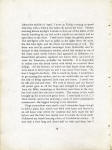 |
| page 25 |
|
thought I would never get the hole deep enough,
and I chose a soft place too. It was Col. C.'s money. About this time 1
began to think I had more clothes than I knew what to do with, though my
wardrobe would have been a show in these times. Large quantities of
clothing, including my most valuable trunk, were sent to a cabin a mile or
two off the road, so poor looking that we thought it would offer no
temptation to search, and so it proved, for we saved everything that was
there. To me it seemed idle to secrete when every servant on the
plantation knew where everything was
hid—in fact, did most of the hiding, but, to their honor be it
said, not a single disclosure was made to their friends and our foes.
Tuesday morning the horses and mules and cows were driven off up the
creek, and hid out in the bushes a few miles from the road and then we sat
down in dreadful expectation to wait.
About noon a small squad of men passed, sent by
General Martin to reconnoiter. General M., commanding our forces at
Asheville at that time, and had come over with his small force to the top
of the Blue Ridge to offer what resistance he might. In a very short time
they came galloping back, saying the Yankees were
just across the river. The time
had now come when all who had determined to abandon the post must leave.
Mrs. C. urged her husband to hide out in the mountains, as he could be no
protection to his family, and it would be a relief to her to have him out
of the way. So off he went, and most of the darkeys disappeared, leaving
Mr. C., with her two little daughters and myself standing in the front
door watching our skirmishers, who were stationed at the front gate and
told us they would fire at the Yankee videttes from that point. The
approaching troops were now heard, but instead of coming up the direct
road, they were on the road up the creek that passed the
25 |
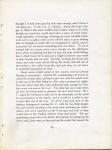 |
| page 26 |
|
end of the house, and came into the main road
at the right angle. As the house was in this angle we saw in a moment that
we would be right in the line if there should be any firing, but
just then our captain lifted his cap and called to us that he had
concluded not to fire from that place lest the enemy should burn
the house.
As they wheeled and galloped off the Yankees
caught sight of them and dashed after, firing on them, our men firing
back. We were dreadfully afraid that they would capture our boys, but they
did not, nor touch one of them. It was said that one of the raiders was
killed, but I cannot vouch for the truth of this. It was stated afterwards
in some newspapers that this was the last skirmish of the war. If so, it
was a remarkable coincidence of dates for it was the I9th of
April—exactly four years from the clay on which the first conflict
occurred in the Confederate war and also the anniversary of the day on
which the first blood was shed in the Revolutionary war.
By the time this little skirmish was over the
horrid blue' coats were swarming in and through and around the house. We
stood in the front door, hoping to keep them out, but when we looked back,
they were pouring in the back door, and every other door and window. They
rushed past us and up the stairs and
in every room. Every office and out house seemed to be full of
them, and still they came. It seemed to us that there were about a million
of them, but I suppose there were only a few hundred in the yard. An
impudent lieutenant demanded of me where the horses were secreted. He
hooted at my reply that the negroes had taken them off and hid them. He
asserted that he was a Southerner—a Kentuckian, and knew as much about
negroes as I did, and that was a likely story which I was telling. I told
him that if he was a Kentuckian he ought to be ashamed
26 |
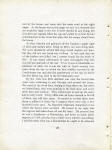 |
| page 27 |
|
of being in that
band of marauders. After some more insolence he departed in search of the
horses, saying, "Be sure, miss, we will find them; Yankees never fail in
search." In the meantime Mrs. C. and I took seats in the porch and waited
an hour or two until the road and the house began to thin out, and hoping
that they had all passed, we began to reconnoiter. The pantry was as bare
as old Mother Hubbard's cupboard. Most of the meat had been taken out of
the smoke-house, and what was left was thrown down on the floor and a
barrel of vinegar poured over it and then covered with dust and ashes. It
was some consolation that the next set that came along took this same
meat and ate it.
The spring-house
was as bare as the pantry, and as far as we could see, nothing was left to
eat. Some old turkeys which were setting had their heads cut off, but were
still "a setting" in headless dignity on their nests. Another squad of
regular plunderers now came into the yard, and we resumed out stand in the
front porch. They demanded clothes, provisions, etc., and threatened, if
not supplied, to sack the house. We told them to sack away; that their own
people had been there, and they would not be apt to find much left. They
started on their rounds, but soon returned for the keys. It was then
discovered that the keys had been carried off by the first set (a good
many of them were found weeks afterwards scattered over a wheat field near
the house). They pretended not to believe this, and declared with very
rough language that they would open the doors anyway. (A few of them had
been left locked.) We soon heard them splitting out the panels with an
axe, but finding little or nothing, they soon rode on cursing the house
and its inmates as they went. Night was now drawing on, and to heighten
its horrors, a dark thunder cloud was rising in the
27 |
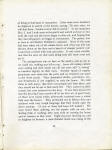 |
| page 28 |
|
west, and when we went to Mrs. C.'s room to try
to arrange for the night, we found that we had no light. The candles were
in the press with heavy oaken doors,
the keys were gone, and we had not skill or strength to break the
locks Or split the doors. The very idea of being left in darkness, and
those wretches so near us! Just then some of the negroes came peering
around, and one of them told us that Col. C. had been taken prisoner, but
was paroled (he was over 60 years old) and had sent him down to see if Mrs. C.
was willing for him to come home and stay that night. She was not willing,
for she thought both he and we were safer if he was absent, so she sent
him word to remain where he was. There was a large pile of new shingles at
the back door with which to recover the house. We carried in enough of
these to keep a light all night, built up a fire and sat down after
bolting and barricading the door as best we could. The room was in
desolate confusion, the beds thrown down on the floor, bureau drawers out
and pulled to pieces and darkness and discomfort all around. We had no
supper and wanted none. The children went to sleep, but Mrs. C. and I kept
watch. We afterwards learned that there was a camp on each side of us, but
the rain fell in torrents, and there was little passing and no stopping
until the morning light, for which we were most truly thankful.
Aunt Hannah, the negro cook, came early in the
morning to say that she had some breakfast for us, but " 'lowed it was not
worth while to bring it up there—some of 'em would be coming along and
snatching it." So we marched off to her cabin, where she had set a table
as neatly as she could, and prepared for us a turkey, cut up and stewed,
saving part uncooked for future meals, scrambled eggs, bread and butter
and rye coffee. From the same hospitable cabin we got all our
28 |
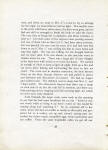 |
| page 29 |
|
meals for the next five days, the negroes
catering for us, and using their own rations, which had been given to them
for the week only the day before, and which the Yankees did not take. Col.
C. came in and informed me that the raiders had come through Lenoir, where
my home was, and now my troubles were increased ten-fold by anxiety about
my dear ones there.
A clear beautiful morning followed the rain,
and as the house was too forlorn to occupy, we took possession of the
front porch again. Very soon another
regiment that had camped below commenced passing. Fewer stragglers
came in this morning, and they, finding nothing, remained but a short
time. The gate was open, and a mounted soldier turned from the column, and
galloped up to the very door, and said, "I would like to see Miss R. Is
she here?" If his Satanic
majesty had called for me, I could scarcely have been more astonished,
but I stepped to the edge of the porch, and announced that I was Miss R.
"I guarded your father's house when in Lenoir," said he, "and here is a
letter which I promised to deliver to you." I seized the letter, but
turned with eager inquiries to the man. "How long were you in Lenoir? What
did you do there?" "Oh, Lenoir
was not injured by us at all, we stopped there one day with our prisoners
but no houses were burned." I knew then that they had eaten up the meagre
[sic] supplies which the village afforded, if nothing more. I thanked him
as he rode away, and then turned to the letter. O, how glad I was to get
that letter, and to hear that my folks had come off so lightly in the sore
visitation.
About this time a young lieutenant rode in,
bowed politely, and asked for a drink of water. He looked more like a
gentleman than any of them I had seen, and I made bold to tell him how
his men had been behaving and asked him if he could
29 |
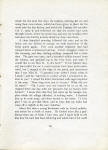 |
| page 30 |
|
not stay and guard us while a negro regiment
that was just coming in sight was passing. He politely acceded to my
request, and ordered a big black negro in an officer's uniform, who was
just going into the back door, back to the lines. Oh! how horrid those
negroes looked in that blue uniform; and how the air was filled with
oaths! But that was characteristic of their white comrades also. Did our
army fill the air with blasphemies as they marched along? How thankful we
were to have protection, even for this hour. The officer guarding was
Lieutenant Davis, a Kentuckian. He told me that he had been raised by a
good father and mother, and that he was heartily ashamed of being in such
a command—that his cheeks had tingled at the outrages they had committed
ever since they started from Tennessee. I told him I thought he had good
reason to be ashamed. He said that the stragglers who followed the raid,
and belonged to no command, were the worst, and that as the regiment just
passed was the last, we would probably be more annoyed than we had been
before, but he was the officer of the day, and if stragglers should come
in, to say that he had just left, and threaten them with him. Regretting
that he must leave us so unprotected, but compelled he said, by his duty,
he now followed on.
Col. C. had been about
the house all the morning, continually
urged by his wife to hide out again, but reluctant to leave. Scarcely had
Lieutenant Davis gone before we saw half a dozen men dashing up the creek,
whooping and yelling and cursing, and as drunk as they could be. There was
a still house half a mile down the creek, and straight from it they came.
Col. C. was in the parlor and there was no time to get out unseen. Mrs. C.
entreated him to remain quietly seated on the sofa, which was on the same
side with the door, which opened on the front
30 |
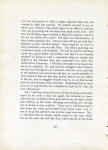 |
| page 31 |
|
porch, and in the doorway we stood to keep him
from being seen. The wretches left their horses at the gate, fairly ran up
the walk, and two of them rushed up to Mrs. C., and with cocked pistols
nearly touched our breasts, demanded all the watches and jewelry in the
house. Col. and Mrs. C. had hid their watches, but mine was concealed on
my person. I had no idea of giving it up. I knew they were only
threatening, and did not suppose
they intended to shoot us, but in their tremulous, drunken hands, I knew
there was great danger of the pistols firing. We threatened to report them
to the officer of the day, who, we told them, was near at hand, but they
cursed him and all other officers, and said they belonged to no command
and feared nobody. Still we stood there, determined to keep them from
seeing into the room. Mrs. C. was an invalid, and with extreme terror for
her husband, who was so near her, and yet so powerless to protect her, I
feared she would faint, but she did not. We stood our ground and they
stood theirs, holding their pistols pointed close to us, and making horrid
threats of what they would do if we did not disclose the hiding place of
various hidden treasurers, but especially of the watches, which they
declared they would have—every one of them, and moreover that they knew
exactly how many there were in the house. Two more of the gang now called
out that they were going to burn the house and placing some straw and
other light material on the floor of the porch, they put a match to it,
and up it blazed. We thought our time had come now sure enough, but there
was nothing to do but escape ourselves, and there was time enough for
that; so we just stood still, and to our surprise they knocked out the
fire themselves before the floor had fairly caught. Some of them in the
meantime had been looking about the house, and finding it so bare, came
out saying, "Come along
31 |
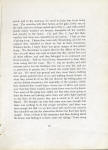 |
| page 32 |
|
boys and let the women alone, there's nothing
to be got here," and so they left. As soon as they were out of sight Mrs.
C. turned to her husband and said, "Now go, and I beseech you not to come
back again while these dreadful creatures are about. You see you can be no
protection to me, and I am a thousand times more afraid when you are here.
They threaten to kill, but they would kill you." So he went but he did not
stay.
For several hours we now sat in solemn
stillness. There was no passing, and we began to hope that it was all
over, and that we had seen the last of them but it was a vain wish.
A captain with 50 men now came over with a flag
of truce from General Palmer to General Gilliam. Palmer had turned off at
Morganton, going across by Hickory Nut Gap, while Gilliam was attempting
to cross at the Swannanoa Gap. He came in and ordered supper for his men
to be served in half an hour. Mrs. C. told him there was nothing to cook,
and she had no one to cook it if there was. "Cook it yourselves," said he
with the most impudent tone and manner. "I intend to have supper, and if
you don't get it for us, I will turn my men loose in the house." That was
not a very serious threat, considering the condition of the house after
his people had been loose in it a day
or two. We gave him to understand that we neither could nor would
cook for him, and in marched his men. We heard them setting the table in
the dining room and making a great clatter, and wondered what they were
doing. So far as we knew there was not a thing to eat in the house. After
an hour or more they filed out, and the captain, after stopping for
another insolent word with us, rode on.
We then ventured into the house to see what
they had been doing. At the dining room door we stopped and laughed. A
long table was set out, covered with the remnants of a feast
32 |
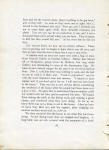 |
| page 33 |
|
that seemed to
have been composed of corn batter cakes, and sorghum, and over everything,
floor, table, dishes, chairs and all, they had smeared sorghum. We raised
our skirts and tipped across to the kitchen where the same scene of dirt
and confusion met our eye. Mrs. C. then remembered that she had a bag of
meal and a keg of sorghum thrown up above a half open ceiling in a narrow
entrance leading to the kitchen, and this, overlooked by the others, they
had found.
We made no
attempt to clean up and the house remained in the condition they had left
it for days. Night was now at hand and we began to dread going into the
house. It seemed safer in the open air. We, two lone women and two little
girls, felt so awfully desolate and forsaken in that great bare house in
darkness. We hoped, however, that the last enemy was far on his way, and
we would see no more of them till the
judgment day. Just at dusk, however, here came a long column
marching back. General Martin had come from Asheville to the top of the
Blue Ridge, and so obstructed the narrow mountain road, by felling trees
and throwing in large stones that, as one of the Yankees told me "it would
take a month to clean out the road." So they were all returning and would
"go around by Hickory Nut Gap." Just to think of having all that army pass
us again! Col. C. now came in, and said that a regiment would camp out
before the door, and the colonel—Howard, I
think was his name—would make his
headquarters in the house. I stepped out into the porch which was
filling with men, inquired for the officer of the day, and, in the fading
twilight, recognized the man who
presented himself as Lieutenant Davis, our friend of the morning.
Informing him that Mrs. C. was sick and ready to give up with fatigue, I
begged him to put a guard at the door of our room. He brought up his
colonel, in-
33 |
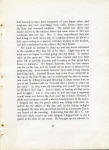 |
| page 34 |
|
troduced him, who
expressed great regret at the treatment we had received, promised all we
asked and bowed himself off. Supperless, we bolted ourselves in, fixed up
the beds and went to sleep and slept all night. Col. C. called to us to
look at the camp fires but we did not care to see them. I am surprised
that he thought they looked pretty, as they were built up of rails,
leaving exposed his growing fields.
The next morning
our polite colonel- started on an early march. On one side of the road was
a broad field of wheat, now the latter part of April, giving promise of
abundant harvest. A halt was made, which for a moment we
did not understand, but the
explanation came soon enough. The fence was torn down, and over and over
the growing wheat that cavalry galloped in wanton destruction. This was
after the war was over, Lee having surrendered, though the raiders would
not believe it. A flag of truce had been sent from General Palmer
to these men only the evening before,
so this piece of maliciousness was purely gratuitous.
This was only a
repetition of the day before. One man wanted shirts for the hospital. Col.
C. told him he could not find one in the house, he was sure. "Well, sir,"
pointing his pistol at him, ^give me the one you have on." He went in the
house and took it off and was left with only his flannel underwear, and
the man rode off with his shirt.
One party found
an old rifle and a musket, and with great furore [sic], broke stock and
lock, and dashed them over the terrace into the creek. Never shall I
forget the horrid clangor of those great cavalry spurs and sabres [sic] as
they dragged over the bare floors of those long passages and porches. Mrs.
C. was still sick so we could
not remain out doors* Without ceremony they rushed in and out of her room,
a kick at the door was the
34 |
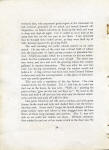 |
| page 35 |
|
[Photograph] "Buck
Creek Ford at Pleasant Gardens." |
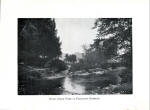 |
| page 36 |
|
only way in which they asked permission to
enter. We left the doors open after a time to avoid this. Once a mere boy
with a. red head and a redder face—hot from the bottomless pit he
looked—ran in as if pursued, jerked open drawers, banged the closet doors,
and at last reached up on the high old-fashioned mantel, pulled open the
old clock door, and down it came with a bang on his head, the weights
falling out and the whole thing coming down with a crash on the floor. All
this time he had seemed never to notice that the room was occupied; but
just then his pursuer appeared
with a raised sabre [sic], and out of the back door, one after the other,
over the banisters of a high porch, away they went, and we saw them no
more. We had missed our breakfast that morning, for just as we entered
Aunt Hannah's door, two or three blue-coats ran out with the breakfast in
their hands. It was a little tantalizing, but we had not much appetite,
and I don't think we were as much disturbed as Aunt Hannah was over it.
Another night now came on with all the terrors
of darkness. I felt comparatively strong during the day, but the utter
helplessness of two weak women and children made my heart faint at night.
We were entirely alone. After the encounter about the shirt Col. C.
again left, having promised his wife not to return till the Yankees were
all gone. We fastened the doors of our room as securely as possible,
determined not to open them to any comers, but knowing well how easily
they could be forced open, we could only hope and pray that none would
come during the night. Whenever we heard horses hoofs our hearts would
rise up in our throats, but when we heard the splash in the creek, we knew
they had passed for that time, and thanked God for that.
Sometime after midnight we heard a halt. In
breathless
36 |
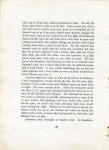 |
| page 37 |
|
terror we listened to the sound of spur and sabre [sic] and heavy tramp up
the walk, through the passage, down the long porch of the L, in which was
our room, and straight to our door, where the sound stopped, with a kick
on the door. Not a word could we titter. A rough voice cried, "Open the
door. We want a light to go to the barn." No answer. "Open the door, or
we'll break it down," was howled with an oath from the outside. Mrs. C.
then spoke, "I have but one piece of candle" (she had found this in one of
the rooms) "and I cannot give it to you." "Give us a piece of it," they
cried. "I have no knife to cut it," said she. "Open the door and we'll
give you one." She hesitated. After a moment she said,
"If you'll promise not to come in, I'll open the door wide enough
to get the knife, and give you a piece of the candle." They promised. I
did not trust to "honor among thieves" and expected them to push in. But
she opened a crack in the door, got the knife, gave them the candle and
off they went. Just after daylight, the same rough voice was heard at the
door. "Open this door, I tell you, or I'll break it open," and heavy kicks
followed under which the door threatened to give way every moment. We now
concluded to open the door. A man, rather old, with the most frightful
countenance I think I ever saw, pushed in. I think I should know that face
after all these years. He came pretty near where I was standing, and
immediately spied an insignificant breastpin which I wore habitually, and
had not thought of concealing. "Give me that pin," he insolently
demanded. "No, you cannot have it," I said.
"If you don't take it off, I'll
take it off for you," he replied. "No, you will not dare touch me," I
said. I moved back toward the fire-place, where there was a large iron
shovel, keeping my eye fixed steadily upon him as he slowly moved after
me. I determined
37 |
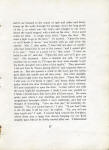 |
| page 38 |
|
if he attempted to touch me to seize the
shovel, and do the best I could with it. 1 never took my eyes off him, but
did not allow him to shorten the distance between us, as he moved towards
me, I moved back till we had gone half way around the room. I persistently
refused to let him have the pin, and to all his horrid threats told him he
dare not touch me. "Dare not," he said. "I fear not God or man." "I fear
God," said I, "and you cannot harm me." After many minutes, as it
seemed to me, he moved off, leaving me
weak-kneed, and ready enough to drop into the nearest seat. A few
days before a lady in Lenoir had been knocked down and robbed or her watch
by one of this same gang of marauders, and I know of no earthly reason why
this wretch should have desisted, but
just at that hour, as I afterwards learned, my clear father was on
his knees, imploring the protection of God on his absent child, amid the
dangers by which she was surrounded.
The day passed in comparative quiet, only a few
stragglers, and they employing themselves in digging around for buried
valuables, but not one thing did they get. It was found that they had dug
within six inches of the box of hams, and still failed to find it. The
horses had been found on the second day, and the children's pony was
paraded up and down at the front door before their tearful eyes before
they carried them off. Toward evening, quiet settled upon us. No raiders
had passed for hours, and we were beginning to breathe freely as we sat in
the soft April sunlight, which seemed to be the only thing that vile man
could not mar. Down the road from Morganton at last rode two men. They
might be friends, but for fear they might be foes, we retired to the back
of the house, and shut the door. In a little while we heard a knock at the
front entrance. "O, Mrs. C.," I cried, "that's no Yankee! They come
38 |
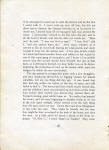 |
| page 39 |
|
in with a kick, and never with a knock." I flew
to the door, and there stood a Major in the lovely Confederate uniform.
It seemed to me months since I had seen
a friend, and I thought he was the handsomest man I had ever seen.
He introduced himself as Major Herndon from Asheville (I learned later a
brother-in-law of Governor Vance), and I seized the hand which he offered
with both mine, and came near kissing him.
Mrs. C. now came forward, recognized
him, and begged him to stay all night. He said he wanted to stop,
but his servant at the gate was in
charge of two fine horses which he was anxious
to get home without encountering any
Yankees. We told him none had passed since noon, and we thought the
horses could be sent to a place of safety. We walked to the gate with him,
and while we were consulting about the best disposition to make of the
horses, one of the negroes came running around the corner crying, "Run,
massa, run; for God's sake, run! They's a comin' from the still house just
as drunk as they can be!" One leap to
his horse's back, and with "Good-bye, ladies, I am sorry to leave
you," he was gone. Back we ran to Mrs.
C.'s room, and shut the door, but from the window we could see and
hear the drunken crowd whooping and cursing. In a
moment they rushed in, and were
standing before us with pistols
presented, crying, "Meat, give us meat, or we'll shoot you." Mrs. C. told
them they might have all they could find, but there was none there.
Finding we were not to be intimidated by pistols and oaths, they left us,
and after a fruitless search in the smoke house, they rode off. If I
remember aright, these were the last of the raiders that we saw but it was
days before we felt secure.
Time and space fail me to relate the result of
the inventory taken soon after, but I will only say that old Aunt
Lucindy's
39 |
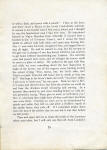 |
| page 40 |
|
shroud was one of
the things that this noble army took away with them. She was an old
African — a "king's daughter," of course, in her native land. She was said
to be over a hundred years old, and had her shroud laid up in her "chist"
for many years. A rapacious blue-coat dragged it out, put it on, danced
around in it to the infinite horror of the negroes, and, in spite of their
entreaties, carried it away.
E. L. R.40 |
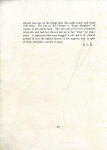 |
